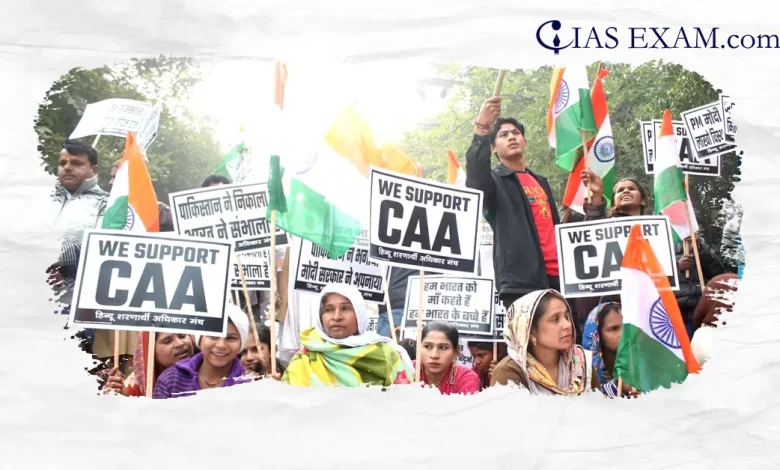Daily Current Affairs for UPSC
CAA rules to be announced before Implementation of Election Code
Syllabus: Governance [GS Paper – 2]

Context
Recently, the govt. of India has announced that CAA is mostly going to be enforced in 2024 before the election code of conduct. Need to mention that CAA (Citizenship Amendment Act) would benefit the refugees waiting for citizenship from designated neighbouring countries. In general, it is aiming for the religious minority communities.
Details about the CAA
- While the Citizenship (Amendment) Act of 2019 repairs some historical injustices established during the old Citizenship Act of 1955, it does not provide a comprehensive solution. It includes several key elements.
- The CAA 2019 aims to give Indian citizenship to particular minority groups in neighbouring nations Bangladesh, Pakistan and Afghanistan.
- Under this provision, anyone from these religious groups who entered India on or before Dec. 31, 2014 will be eligible for consideration for Indian citizenship.
- The Expedited Citizenship Act lowers the residency requirement in India for certain individuals from 11 years to 5 years.
- The act does not apply to Muslim communities from certain countries, nor are tribal areas within certain states or areas under the Inner Line Permit regime affected.
- While the government maintains that it is trying to help persecuted religious minorities, the act has been criticised for discrimination against Muslims and for violating the secular principles of India’s Constitution. This has led to protests and legal challenges.
- Widespread Indian protests broke out over the Citizenship Amendment Act, with many critics in court as it was debated whether or not the legislation was constitutional.
- As of the latest updates in 2024, the CAA ‘s implementation is now being discussed and its final draft is expected to be completed soon.
Rules of the CAA
- The Citizenship (Amendment) Act, 2019 (CAA) represents a change in citizenship law from 1955. Under this amended version adopted last December, it now aims to provide an easier path for individuals who suffer religious persecution from one of three nations (Afghanistan, Bangladesh, or Pakistan) to acquire Indian citizenship.
- The CAA specifically extends this protection to Hindus, Sikhs, Buddhists, Jains, Parsis and Christians who came to India before the end of 2014, before these migrants waited an average 30 years in order upon arrival for residency rights. To help them along with becoming naturalised citizens if they so wish, the Act reduces this 12-year period to 6.
- The CAA does not apply to Muslims from these three countries, though. Nonetheless, people in India have been demonstrating in significant numbers against it due to its exclusion of Muslims.
Why Rules of the CAA were not notified earlier
- There has been no explicit statement on the reasons behind a delay in announcing the rules for the Citizenship (Amendment) Act (CAA) 2019 but there could be several factors responsible for this One possible explanation might be the complexity of the law itself.
- It may have required careful consideration and careful examination in order to establish the right rules for its implementation.
- Additionally, extensive administrative preparations might have been necessary before crafting rules could be completed and put into effect under real-world conditions.
- A further reason that would lie in the timing of notification is on how CAA will affect socio-political structure and its likely conflicts or reactions.
- Another even such factor, is that the widespread protests and criticisms resulting from the enactment of CAA may have caused the government to postpone implementation regulations until regaining public opinion following some expression from those concerned.
- For a more comprehensive understanding of the situation, it is best to refer to authoritative news sources or official government releases.
Conclusion
- The implementation and consequences of the Citizenship Amendment Act, 2019 (CAA 2019) have sparked extensive discussions within Indian society, setting off widespread debate.
- As if flouting constitutional guarantees of equality under citizen law aside as might otherwise be assumed during India’s post-independence era of cosmopolitan vision for mankind Sure enough, this recent policy orientation change in the issue with international implications has brought CAA back into prominence.
- So, people are now discussing its consequences right in the streets and closely monitoring when it will be put into action.
Source: The Times of India
UPSC Mains Practice Questions
Q.Critically Evaluate the Pros and Cons of the Political Impact in the country if Citizenship Amendment Act 2019 is notified.(150 words)





.png)



